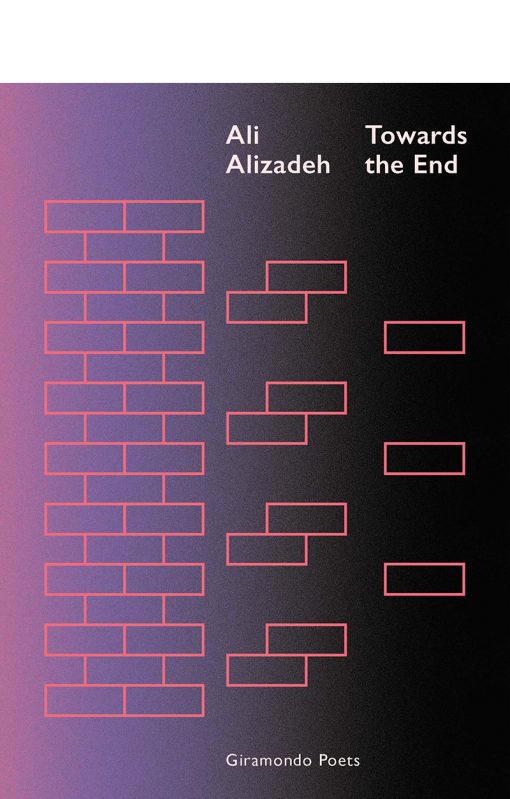Kiran Bhat reviews Toward the End by Ali Alizadeh
 Toward the End
Toward the End
By Ali Alizadeh
Giramondo
ISBN 978-1-925818-22-2
Reviewed by KIRAN BHAT
While it was a mainstay of early 20th century writing, the styles, tendencies, and structures of social realist literature went out of vogue fairly quickly. Perhaps it is because of the proselytising nature of such texts, or because works of only one particular vision or message tend to lose freshness on multiple reads. Nonetheless, we live in a time where plenty has gone awry, and the world needs stronger voices yet. From the pages of Towards the End, it is clear that Ali Alizadeh aspires to be one such voice. He is eager to observe the hypocrisies and toxicities of an Australia connected to the global economy, and he aspires to use poetry as a space to right his country’s wrongs.
Alizadeh is a master of the cynical and the bare. He often likes to string words together into the most uncomplex sentences, to make sure that the theme or topic of his words hit with the greatest impact. The poem ‘Refugee’ begins with the warning, ‘If you come to this country without a visa you won’t be settled in this country,’ just as the poem ‘P.S.’ begins with a proclamation: ‘We are decent. We love our country and our liberty.’ Though Alizadeh is writing so directly, his words do not speak with an intimacy. Rather, there’s a deep frustration embedded at how things are in Australia. There’s a sense that no matter how much people of colour give themselves to Australia, the last thing they will be given is acceptance, or a place in society, and Alizadeh uses his poetry to call it it what it is: messed up.
What makes these poems more than exercises in didacticism is how Alizadeh’s poems move from the stark to the unexpected. Returning to the poem, ‘P.S.,’ one assumes that the poem is meant to be a stripping down of everything that makes Australia an inherently difficult country for its outsiders. What it becomes in the middle is an ode to the impossibilities of capitalism, instead.
‘We dream
of feeling happiness as psyches rejoice
at buying iJunk and designer socks, a life
finally expiating its futility
if lucky, with a (record low) pay rise.’
The tone of the poem remains colloquial, but the jumble of words like ‘expiating’ with ‘futility’ create a unique sound, while images of ‘iJunk’ next to ‘designer socks’ render a clear vision of an archetype – Melbournian, hipster, most likely addicted to anything Apple throws their way – Alizadeh is trying to criticise. But, Alizadeh is not trying to stereotype, nor is he trying to cast judgment. He’s just tired of the way things are, and he wants it to change, hence why he concludes his poem on a summoning of the ‘immeasurable power’ of human will to ‘rupture the reality of the world and instigate new worlds.’
Alizadeh is also a master of wordplay. Most of his poems demonstrate a unique use of vocabulary to allow the sounds of the English language to reach greater heights. Take his poem, ‘Destinal,’ in which one casually intrudes upon sentences like ‘ink stains on the paper occlude the noumenon.’ The long /o/ of ‘occlude’ along with the length of syllables in ‘noumonen’ create an extremely satisfying mouth muddle that is hard to imagine succeeding if penned by another writer. In the poem ‘Post-Marx,’ Alizadeh remarks,
‘Landlords don’t lord
it over overindulged
go-betweens
poised between domination and damnation
by market’s melodramatics.’
Each line is built on an alliteration, and a subversion of words that appear similar in length and consonant (‘landlord’ and ‘lord,’ ‘domination’ and ‘damnation, ‘market’ and melodramatic’). The meaning of the words clash, however. As a result, the pairing of these words create harmony and cacophony, nonsense and consequence, all at once.
In my opinion, the strongest poem in the collection is ‘Australian Day.’ The poem showcases all of Alizadeh’s strengths in one piece of writing, and does so with cohesion. For example, the beginning few lines have all of the trademark punch and power of Alizadeh’s starts.
‘Barbeque and cricket
and now you’re a citizen. I’d slap
my own ungrateful
subject’s face.’
Yet, lines like ‘I’d kick my heart for its failure to attract another’ inspire a rare empathy and pathos. There’s a sense that as Alizadeh reflects on his inabilities to measure up to the Australian standard, he is more willing to be vulnerable. He even ends his poem on a very real desire that most second generation people feel when they are born and raised in a country that does not understand them.
‘It’s called
hope
for an encounter, a place
in the universe
of the loved.’
Liminal and exciting, deceptively simple on a language level, yet eagerly complex on a conceptual one, Towards the End is a unique space where memory, sentence, and language align. Alizadeh’s lines live in the blasé, and yet yearn for what appears to be futile. Alizadeh wants to see an end towards the oppressions that occur from the awkward alignments of capitalism, racism, and societal socialisation. Towards that end, he has fused all the distrustfulness of his voice with all of the registers of postmodern style and structure, to invent a style of social realism that belongs not only to the early 21st century, but very much to Ali Alizadeh himself.